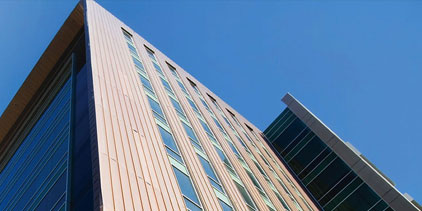Implementing the UN’s Sustainable Development Goals: Guest blog by our Research Assistant – Education and Sustainability, Dr Renuka Thakore
Posted on: 2019-10-02
It was Global Goals Week last week – a week of action and awareness-raising of the UN’s 17 Sustainable Development Goals (SDGs) to achieve a happier and healthier world by 2030. Earlier this month, our Research Assistant – Education and Sustainability, Dr Renuka Thakore, attended a UK-Brazil workshop with researchers from a wide range of universities discussing ideas which can make Brazilian cities more climate-resilient in accordance with the SDGs. Here, Renuka writes about her experience…
The United Nations Office for Disaster Risk Reduction (UNISDR) called for a global campaign for developing resilient cities. In response to this call, Argentina, Brazil and Paraguay came together under a unique ‘Triangle City Cooperation’ project. Several tripartite initiatives among these countries have been developed to shore up the region’s short- and long- term resilience. This includes joint efforts to identify cooperation strategies among the three cities of Foz do Iguaçu (Brazil), Ciudad del Este (Paraguay) and Puerto Iguazú (Argentina): cities which meet at the confluence of borders – and of the major Parana and Iguazú Rivers.
As a result of these initiatives, a high-level meeting was held in Foz do Iguaçu (Brazil), and they committed to work jointly on climate resilience, signing a pledge to create a Sustainable Development Council for the region. It was identified that the tri-border region is highly vulnerable to climate change impacts; the exponential population growth in this region has not been accompanied by adequate urban planning; and infrastructure investment is needed to help populations deal with the constant floods.
The network thus formed by professionals and academic representations of the universities who took part in the initial research project continues to work on making cities disaster-resilient and developing stronger sustainability strategies. To support this commitment and make cities disaster-resilient, a UK-Brazil International Workshop was organised by the University of York (UK) and Unioeste (BR), the State University of Western Parana – with the support of the University of Leeds (UK). This partnership was funded by the British Council Researcher Links initiative, with the support of the Newton Fund and CONFAP/Araucaria Foundation to investigate sustainable strategies for financing Urban Climate-Resilient Development in Foz do Iguaçu (Brazil).
I was pleased that my application to participate at the ‘Financing urban climate-resilient development’ workshop in Foz do Iguaçu, Brazil, was successful and I was able to attend the workshop amongst 70 other researchers, representing 43 universities or institutions. The workshop was jointly organised by Dr Marco Sakai from the University of York and Professor Irene Carniatto from Unioeste at the latter’s Foz do Iguaçu campus.
The workshop focused on identifying and leveraging the capacity to exploit small and medium-sized cities’ internal resources for financing and creating a resilient development network. The opening ceremony, held at the Alcibíades Luiz Orlando Auditorium at the State University of Western Paraná (Unioeste) Foz do Iguaçu Campus, was attended by researchers from both countries and public administrators from the trinational region (Brazil, Argentina and Paraguay). The workshop aimed to foster a network of researchers to produce innovative and impact-oriented research that can benefit Brazilian cities. Several parallel sessions were organised for the delegates to present their research and address the question: ‘How can we make a city more resilient?’ The researchers presented specific solutions contributing to the area of climate-resilient development.
Having expertise in energy management and sustainability within the context of urban English housing, I presented a conceptual model – STRIDES (Strategic Tri-level Relational Interventions for Delivering Energy efficiency and Sustainability), which purposefully addresses the barriers of leveraging sustainable transformations, and critically challenges thinking and engagement of relevant stakeholders. STRIDES explicitly captures 5 INs (investment, information, innovation, incentive, and initiative), which embodies interrelated essential conditions needed for successful transformation. This conceptual model was developed using a mixed-method approach, engaging constructivism/interpretivism to guide the development and augmentation of this (to ensure maximum relevance and impact).
The English housing system was used as the primary lens – which helped both shape and inform the research methodological approach. Adopting a transdisciplinary approach, STRIDES was developed using a rich data set that was consolidated through: an online survey questionnaire (for systems-knowledge); Delphi questionnaires (for target-knowledge); and focus group discussions (for transformative-knowledge). The STRIDES model and its underpinning theories which have the potential to increase the capacities of leadership and regulatory compliance at multiple levels were highly appreciated by the audience in the workshop. The model was recognised as having the potential to evaluate policies and empower audiences who have stakes in policymaking for increased sustainability and disaster resilience.
The workshop provided me with high-quality engagement opportunities with academics and stakeholders from many countries, namely Brazil, Argentina, Paraguay and the UK.
Following the workshop, I am looking forward to serving as ‘Champion of the month (October)’ to the UK-Brazil partnership network and engage in strategic projects focusing on meeting the following Sustainable Development Goals (SDGs):
GOAL 13 – Action against Climate Change;
GOAL 11 – Sustainable cities and communities;
GOAL 7 – Clean and Affordable Energy;
GOAL 6 – Clean water and sanitation;
GOAL 4 – Education;
GOAL 3 – Health and well-being, taking actions that include quality of life, water and food quality, waste management and sanitation, recovery of degraded areas, rivers and springs, clean energy and fuels, education for sustainability, and contribute to more sustainable, safe and resilient cities.
For more on the UN’s SDGs, head to its website.




